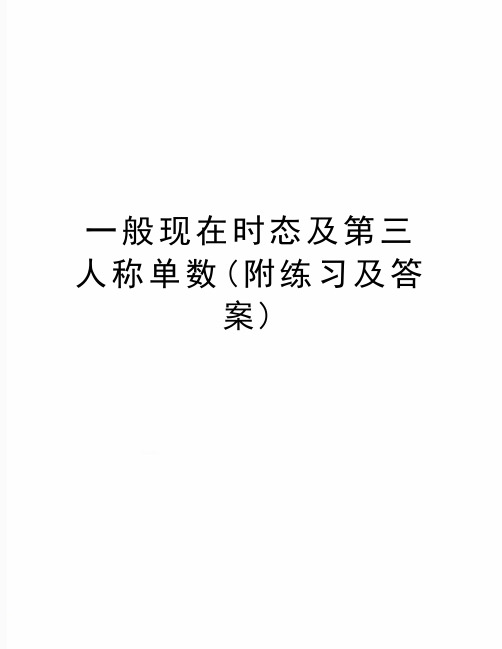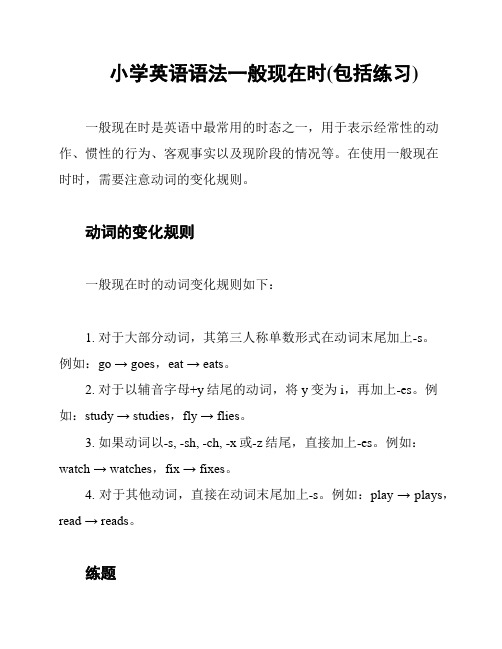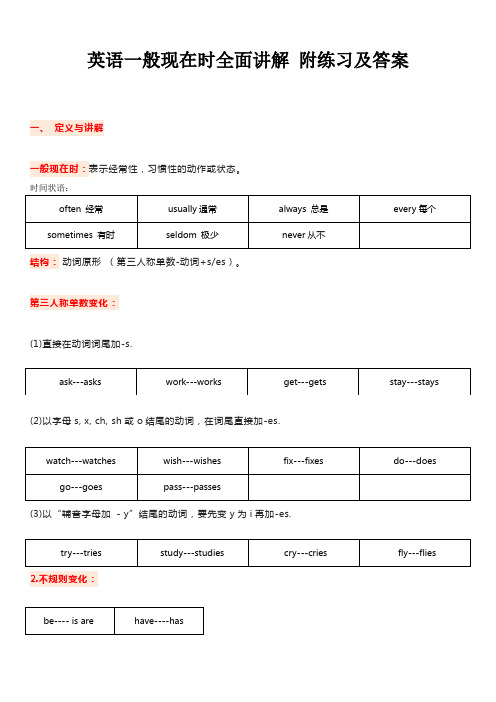小学英语一般现在时三单动词的变化规则及练习题(1)
一般现在时讲解 动词三单 练习题

一般现在时讲解+动词三单+练习题定义:①表示现在的状态,如:Tomisastudent..②表示经常发生或习惯性的动作或状态,如:Weoftenplaybasketballtogether.③表示主语现在的性格、特征、水平,如:LucycanspeakFrench.结构:I.当谓语动词是be时谓语动词be包括am,is,are.其用法是:我(I)用am;你(you)用are;is用于他(him)她(her)它(it);复数人称都用are.-主要句式:1.肯定句式主语+be(am,are,is)+其他。
Sheisapretty.2.否认句式主语+be(am,are,is)+not+其他。
Sheisn’tpretty.3.一般疑问句将提前be(am,are,is),即:Be(am,are,is)+主语+其他?Isshepretty?肯定回答Yes,主语(必须是代词)+be(am,are,is)Yes,sheis.否认回答No,主语(必须是代词)+be(am,are,is)+not(必须用缩写形式isn't/aren't)No,sheisn’t.1.用be的适当形式填空1.---How____you?---I____fine.2.I___David,andmyfamilyname___Green.3.---Whatcolor___yourclock?---It___white.4.---What___thisinEnglish?---It___anapple.5.Toy___mybrother.David____mybrother,too.They___mybrothers.2..将下面的句子变成一般疑问句并作出回答1.Thatismyfootball.2.Thosearehisbooks.3.JimandTomaregoodfriends.4.MybirthdayisNovember1st.5.Hissonistwelveyearsold.3.将下面的句子变成否认句1.Hiscardisonthetable.2.Thereissomewaterinthebottle.3.BobandTonyareourfriends.II.当谓语动词是实义动词时1.当主语是第一人称(____\___);第二人称(____)及复数时(1)肯定句主语+实义动词+其他WeliveinShanghai.(2)否认句主语+don’t+实义动词+其他(3)一般疑问句Do+主语+实义动词+其他肯定回答:Yes,主语(必须是人称代词)+do.否认回答:No,主语(必须是人称代词)+don’t.2.当主语是第三人称单数he,she,it及单数的名词时,主要句式:(1)肯定句:主语+实义动词的第三人称单数形式+其他Helive s inShanghai.(2)否认句:主语+doesn’t+实义动词的原形+其他(3)一般疑问句Does+主语+实义动词的原形+其他肯定回答:Yes,主语(必须是人称代词)+does否认回答:No,主语(必须是人称代词)+doesn’t变化规则:动词第三人称单数形式特殊变化have----has1.一般情况加s,“S”在清辅音后发音为[s],在浊辅音及元音后发音为[z]。
小学英语一般现在时三单动词的变化规则及练习题

在句子中,一般现在时三单动词的变化规则可以用来描述事实、表达观点 或传达信息。
通过使用一般现在时三单动词的变化规则,可以使句子更加简洁、明了, 易于理解。
在英语学习中,掌握一般现在时三单动词的变化规则在实际中的应用非常 重要,可以提高语言表达能力。
一般现在时三单 动词的变化练习
题
单选练习题
一般现在时态中,动词第三人称单数的变化规则是:A. 动词原形 B. 动词+s C. 动词+es D. 动词+ing
下列句子中,动词形式正确的是:A. He like playing basketball B. She goes to school at 7:00 every day C. They like to eat apples D. We don't like to play in the rain
在日常交流中的应用
描述日常行为和习惯
表达经常发生的动作或状态
描述事物的性质和特征
表达个人的喜好和意愿
在写作中的应用
描述日常行为和习惯
表达个人观点和喜好
描述事件和经历
编写故事和虚构情境
感谢您的观看
汇报人:XX
下列句子中,动词形式不正确的是:A. He plays basketball every day B. She eats an apple every morning C. They like eat apples D. We don't like to play in the rain
下列句子中,动词形式正确的是:A. He doesn't like to eat vegetables B. She doesn't like playing the piano C. They don't like to read books D. We don't like eating apples
一般现在时的三单练习题

一般现在时的三单练习题一般现在时是英语中最基本的时态之一。
它用于描述经常性的活动、事实和真理,以及当前的情况、状态和感受。
一般现在时的主语为第三人称单数时,动词需要加上-s或-es 结尾。
下面是一些练习题,帮助巩固对一般现在时的理解。
练习题1:1. My sister _________ (work) at a hospital.2. John _________ (like) coffee with breakfast.3. The sun _________ (rise) in the east.4. They _________ (play) basketball every Saturday.5. Sarah _________ (watch) TV in the evening.参考答案:1. works2. likes3. rises4. play5. watches练习题2:1. Mark usually _________ (go) to bed early.2. The cat _________ (drink) milk every morning.3. We _________ (have) lunch at 12 o'clock.4. The train _________ (leave) at 8:30 a.m.5. She _________ (read) a book before going to sleep.参考答案:2. drinks3. have4. leaves5. reads练习题3:1. The Earth _________ (revolve) around the sun.2. He _________ (teach) English at a high school.3. They _________ (visit) their grandparents every summer.4. I _________ (listen) to music in my free time.5. Tom _________ (play) the guitar very well.参考答案:1. revolves2. teaches3. visit4. listen5. plays练习题4:1. Birds _________ (fly) in the sky.2. The company _________ (produce) high-quality products.3. We _________ (study) English every day.4. My parents _________ (take) a walk after dinner.5. She _________ (dance) ballet in the evening.参考答案:1. fly2. produces4. take5. dances练习题5:1. The bus _________ (arrive) at 9 a.m. every day.2. I usually _________ (go) to the gym in the morning.3. They _________ (eat) breakfast together every Sunday.4. The company _________ (close) at 5 p.m.5. She _________ (play) tennis on Tuesdays.参考答案:1. arrives2. go3. eat4. closes5. plays以上是几个关于一般现在时的练习题,通过练习可以更好地理解和运用一般现在时的用法。
小学英语六年级上册易错题时态三单ing

时态易错题一、一般现在时:主语+动词原形或动词三单+多次发生的时间(如频度副词always usually often sometimes on Mondays) 动词原形变三单规则:1.一般情况下直接加s。
2.以s/x/ch/sh/o结尾的动词加es。
3.以元音字母+y结尾的动词直接加s。
(元音字母有a/e/i/o/u)以辅音字母+y结尾的动词变y为i加es。
4.以f/fe结尾的动词变f/fe为v加es。
(仅了解)5.特殊:have的三单是has二、现在进行时:主语+be+动词ing+表示现在的时间(如now,look,listen)动词原形变动词ing的规则:1、一般情况直接加ing。
2、以不发音的e结尾的去e加ing。
3、双写最后一个辅音字母加ing:run-running,swim-swimming,shop-shopping,get-getting,sit-sitting,cut-cutting,win-winning三、一般将来时:主语+be going to +动词原形+将来时间主语+will+动词原形+将来时间(如 tomorrow /this morning/this... /next week/next.../one day )一、写出下列单词的第三人称单数及动词ing形式。
1、buy _______ ________2、clean_______ ________3、help_______ ________4、find_______ ________5、pass_______ ________6、try_______ ________7、get_______ ________8、come_______ ________9、fly_______ ________10、love_______ ________11、eat_______ ________12、pack_______ ________13、wait_______ ________14、speak_______ ________15、finish_______ ________16、wash_______ ________17、watch_______ ________18、do_______ ________ 19、read_______ ________20、play_______ ________21、sing_______ ________22、dance_______ ________23、draw_______ ________24、cook _______ ________25、swim_______ ________26、learn_______ ________27、study_______ ________28、want _______ ________29、send_______ ________30、live_______ ________31、have_______ ________32、take_______ ________33、make_______ ________34、start_______ ________35、late_______ ________36、need_______ ________37、win_______ ________38、pick_______ ________39、meet_______ ________40、plant_______ ________41、look_______ ________42、climb_______ ________43、jump_______ ________44、drink_______ ________45、sleep_______ ________46、listen_______ ________47、talk_______ ________48、like_______ ________49、say_______ ________50、teach_______ ________51、catch_______ ________52、see_______ ________53、ask_______ ________54、give_______ ________55、tell_______ ________56、wear_______ ________57、visit_______ ________58、join_______ ________ 59、share_______ ________60、use_______ ________61、type_______ ________62、chase_______ ________63、hurt_______ ________64、hear_______ ________65、worry_______ ________一般现在时一、用单词的正确形式填空:1.Mike _________ (do) his homework every day.2.He _________ (like) swimming.3.We like ________ (play) basketball after class.4.I like singing. I often _________(listen) to the music in the evening.5.My grandma_________(watch) TV every day.二.单选1. ____Alice often play the piano?No, she _____.A.Do; doB. Does; doesC. Does; doesn’t2. ___ your pen pal _____ in Beijing?A. Do; liveB. Do; livesC. Does; live3. Tom and Mike_________very excited, they will take a trip.A. isB. areC. am4. I like ________ very much. What about you?A. danceB. dancedC. dancing5. Bill and I ___ good friends.A. isB. areC. am6. Sandy often ___ his homework on Sundays .A. doB. doesC. did7. What do you usually do on the weekend?I __________.A. went swimmingB. go swimmingC. visited grandparents8. What do you usually do on your holiday?A. saw elephantsB. sing and danceC.took pictures9. I ____ a student. I go to school ____bus every day.A. is; byB. am; onC. am; by现在进行时一、填空。
一般现在时动词第三人称单数变化规则

一、概述一般现在时的概念和用法:(1)表示现阶段经常、反复、习惯性的动作;(2)表示目前的状况;(3)表示自然界的客观真理。
二、一般现在时的结构时态的结构指的是动词的变化形式。
一般现在时间有两种结构,一种是动词原形,用于主语为非第三人称时的情况;另一种为动词的第三人称单数形式,用于主语为第三人称时的情况。
Eg1. We often get up early in the morning.Eg2. My father often gets up early in the morning.三、谈谈“主语为三单,其后动词s添”在一般现在时中,当主语为第三人称单数时,谓语动词要用第三人称单数形式。
可以简单叙述为“主语为三单,其后动词s添”。
何谓第三人称单数?用一句话概括就是“非你、非我、非复数”,如he, she, it, my father, my mother, my sister, our English teacher, Tom, Mike, Liu Jia, China, my book, etc.Eg3.He sometimes goes to school by bike.Eg4.My father works in the hospital as a doctor.四、一般现在时的肯定句中,主语为第三人称单数的动词变化主要体现在词尾的变化上,其规律为:(与名词变成复数的变法大致相同。
)五、一般现在时的句子转换(1)当句子中有be动词或情态动词时,则把be动词或情态动词(can,could等等)提到主语的前面变成一般疑问句;在be动词或情态动词后面加not变成否定句.例:①陈述句:She is a student.一般疑问句→ Is she a student?否定句→ She is not a student.②陈述句:I can swim.一般疑问句→ Can you swim否定句→ I can not swim.(2)当句子中即没有be动词,也没有情态动词时,则在主语前加助动词do (you,以及复数), does(单数she,he,it)变成一般疑问句;在主语后谓语动词前加助动词don’t(I,you,以及复数), doesn’t(单数she,he,it)变成否定句,助动词后的动词要变成动词原形。
最新一般现在时态及第三人称单数(附练习及答案)

一般现在时态及第三人称单数(附练习及答案)一般现在时态及第三人称单数(附练习及答案)第三人称单数问题一般现在时中,当主语是第三人称单数时,即常在动词原形后加-s或-es。
第三人称单数变化,现归纳总结如下:1.人称代词he, she, it是第三人称单数。
如:He likes watching TV.他喜欢看电视。
She has lunch at twelve.她十二点吃午餐。
It looks like a cat.它看起来像只猫。
2.单个人名、地名或称呼作主语;用第三人称单数。
如:①Han Mei looks like her mother.韩梅看起来像她的母亲。
②Beijing is in China.北京在中国。
③Uncle Wang often makes cakes.王叔叔经常做蛋糕。
3.单数可数名词或"this / that / the/ a +单数可数名词"作主语时,是第三人称单数。
如:①A horse is a useful animal.马是有用的动物。
②This book is yours.这本书是你的。
③That car is red.那辆小汽车是红色的。
④The cat is Lucy's.这只猫是露茜的。
4.不定代词someone, somebody, nobody, everything, something等及指示代词this, that作主语时,第三人称单数。
①Everyone is here.大家到齐了。
②There is something wrong with the watch.这块手表有毛病。
③This is a pen.这是一支钢笔。
④That is an eraser.那是一块橡皮擦。
5.不可数名词作主语时为第三人称单数。
如:①The milk is in the glass. ②The bread is very small.6.当数字或字母作主语时,看作第三人称单数。
小学英语语法一般现在时(包括练习)

小学英语语法一般现在时(包括练习)一般现在时是英语中最常用的时态之一,用于表示经常性的动作、惯性的行为、客观事实以及现阶段的情况等。
在使用一般现在时时,需要注意动词的变化规则。
动词的变化规则一般现在时的动词变化规则如下:1. 对于大部分动词,其第三人称单数形式在动词末尾加上-s。
例如:go → goes,eat → eats。
2. 对于以辅音字母+y结尾的动词,将y变为i,再加上-es。
例如:study → studies,fly → flies。
3. 如果动词以-s, -sh, -ch, -x或-z结尾,直接加上-es。
例如:watch → watches,fix → fixes。
4. 对于其他动词,直接在动词末尾加上-s。
例如:play → plays,read → reads。
练题请根据句子的语境,用适当的动词形式填空。
每个空格只填一个单词。
1. Peter ___________ (like) to play basketball with his friends every weekend.2. My mother ___________ (work) as a nurse in the hospital.3. The cat ___________ (sleep) on the sofa most of the day.4. We ___________ (watch) movies at the cinema every Friday night.5. Sarah ___________ (brush) her teeth twice a day.参考答案1. Peter likes to play basketball with his friends every weekend.2. My mother works as a nurse in the hospital.3. The cat sleeps on the sofa most of the day.4. We watch movies at the cinema every Friday night.5. Sarah brushes her teeth twice a day.以上是关于小学英语语法一般现在时以及练习题的内容。
小学英语一般现在时重点讲解附专项练习和答案

英语一般现在时全面讲解附练习及答案时态主要是动作或状态发生的时间在谓语动词中表现出来的形式。
英语中的时态按照动作或状态发生的时间范畴,可以分为现在范畴、过去范畴和将来范畴。
按照动作或状态的规律性、持续性、与基准时间的先后关系,又分为一般式、进行式、完成式和完成进行式。
英语中的时态可以利用下面的表格来记忆:有统计显示,不管是口语还是书面语中,使用频率由高到低、前八位的时态依次为:一般现在时、一般过去时、现在完成时、一般将来时、现在进行时、过去完成时、过去进行时、现在完成进行时。
剩下的四种时态在所有时态中的使用占比都低于0.02%,这里我们只就前八种时态做说明。
一般现在时在所有时态中的使用占比能达到50%,是英语中使用频率最高的时态,今天我们就来认识一下它。
用法表示经常性或习惯性的动作,常与always(总是)、often(经常)、usually(通常)、seldom(很少)、every day(每天)、sometimes(有时)等连用。
I often get up at 7表示客观事实。
I like English.表示按计划或时间表要发生的事,通常都有一个表示未来时间的状语,如:Are you free tonight? The train leaves in five minutes' time.含be动词的结构含be动词的一般现在时要注意be动词的选用,以及肯定句、否定句、一般疑问句和特殊疑问句的句子结构。
肯定句结构:主语+am/is/are+表语。
比如:I am a teacher. 此时be动词的缩略形式有:I am=I’m; he is=he’s; she is=she’s; it is=it’s; we are=we’re; you are=you’re; they are=they’re。
否定句结构:主语+am/is/are+not+表语。
比如:I’m not a student. 此时be动词的缩略形式有:I am not=I’m not; he is not=he’s not=he isn’t; she is not=she’s not=she isn’t; it is not=it’s not=it isn’t; we are not=we’re not=we aren’t; you are not=you’re not=you aren’t; they are not=they’re not=they aren’t。
人教版pep小学英语六年级上册易错题时态、三单、ing

人教版pep小学英语六年级上册易错题时态、三单、ingPEP小学英语六年级上册易错题时态、三单、ing时态易错题一、一般现在时:在描述多次发生的动作时,使用主语+动词原形或动词的第三人称单数形式+频度副词(如always。
usually。
often。
sometimes。
on Mondays)+时间。
动词的第三人称单数形式的变化规则如下:1.一般情况下,直接在动词后面加上“s”。
2.对于以“s”、“x”、“ch”、“sh”、“o”结尾的动词,需要在其后加上“es”。
3.对于以元音字母(a、e、i、o、u)结尾的动词,直接在其后加上“s”。
4.对于以辅音字母+y结尾的动词,需要将“y”变为“i”,再加上“es”。
5.对于以“f”或“fe”结尾的动词,需要将其变为“v”,再加上“es”(仅了解)。
6.特殊情况:have的第三人称单数形式为has。
二、现在进行时:在描述正在进行的动作时,使用主语+be动词+动词的ing 形式+表示现在的时间(如now。
look。
listen)。
动词的ing 形式的变化规则如下:1.一般情况下,直接在动词后面加上“ing”。
2.对于以不发音的“e”结尾的动词,需要去掉“e”,再加上“ing”。
3.对于以双写的最后一个辅音字母结尾的动词,需要将其改为单写,再加上“ing”(如run-running,swim-swimming,shop-shopping,get-getting,sit-sitting,cut-cutting,win-winning)。
三、一般将来时:在描述将来要发生的动作时,可以使用主语+be going to+动词原形+将来时间或者主语+will+动词原形+将来时间(如tomorrow。
this morning。
this。
next week。
next。
one day)。
练:将下列动词转化为第三人称单数形式和ing形式:1.buy – buys。
XXX2.clean – cleans。
小学英一般现在时讲解和练习

小学英语一般现在时一. 意义:表示经常发生的事情,动作或存在的状态二. 构成及变化1.be动词的变化。
肯定句:主语+be(am,is,are)+其它。
如:I am a boy.我是一个男孩。
否定句:主语+ be + not +其它。
如:He is not a worker.他不是工人。
一般疑问句:Be +主语+其它。
如:-Are you a student? -Yes. I am. / No, I'm not.特殊疑问句:疑问词+一般疑问句。
如:Where is my bike?2. 行为动词的变化。
l、当主语为第一,二人称及复数时,助动词为do肯定句:主语+动词原形(+其它)。
如:We often play basketball after school.否定句:主语+ don't+动词原形(+其它)。
如:we don’t play basketball after school.一般疑问句:Do +主语+动词原形+其它?如: Do you often play basketball after school l? Yes, we do. / No, we don't.特殊疑问句:疑问词+以do开头的一般疑问句?如: What do you often do after school ?2、当主语为第三人称单数时 ,助动词为does肯定句:主语+动词三单式(+其它)。
如: He swims well.否定句:主语+ doesn’t+动词原形(+其它)。
如:He doesn’t swim well..一般疑问句:Does +主语+动词原形+其它。
如:Does he swim well ?Yes, he does. / No, he doesn't.特殊疑问句:疑问词+以does开头的一般疑问句?如: How does your father go to work?三.第三人称单数的动词变化规则(只有在第三人称为主语的肯定句中,动词才用三单式)(1)多数动词直接加s: runs gets likes collets takes plays climbs…….(2)结尾是s, x, sh, ch, o,前为辅音字母,结尾加es : watches teaches goes does washes crosses mixes brushes(3)动词末尾y前为辅音:将y改为i加es: study→studies fly→fliescarry→carriescry→cries但在y前如果为元音则直接加s: buys says四.时间标志:always , usually , often , sometimes ,every…一般现在时练习题(1)I.用下列单词的适当形式填空1.We often___________(play) in the playground.2.He _________(get) up at s ix o’clock.3.__________you _________(brush) your teeth every morning?4.What________________(do) he usually________________(do) after school?5.Danny ________________(study) English, Chinese, maths, science and Art at school.6.Mike sometimes __________(go) to the park with his sister.7.At eight at night, she __________(watch) TV with his parents.8.________ Mike________(read) English every day?9.How many lessons_________your classmates________(have) on Monday?10.What time_________his mother_________(do) the housework?II.改句子1.Do you often play football after school? (改为肯定句)2.I have many books.(改为否定句)3.Gao Shan’s sister likes playing table tennis (改为否定句)4.She lives in a small town near New York.(改为一般疑问句)5.I watch TV every day.(改为一般疑问句)6.We have four lessons.(改为否定句)7.Nancy doesn’t run fast (改为肯定句)8.My dog runs fast.否定句:一般疑问句:9.Mike has two letters for him.一般疑问句:否定句:10.I usually play football on Friday afternoon.否定句:一般疑问句:划线提问11.Su Yang usually washes some clothes on Saturday.否定句:一般疑问句:划线提问:12.Mingming usually waters the flowers every day.否定句:一般疑问句:13.Tom does his homework at home.否定句:一般疑问句:一般现在时练习题(2)一、用所给动词的真确形式填空1.I like ____________ (swim).2.He _________(read) English every day.3.We _________(go)to school at seven in the morning.4.Mike________(go)to school at seven in the morning.5.My mother________(like) ______(go) shopping.6.I can ________(draw) many beautiful pictures.7.She_________(make) a model plane.8.Do you ________(like)_________(run)?9.Does he_________(like)_________(jump) ?10.Does Nancy_________(grow)flowers on Saturday ?11.The teachers________(like)___________(dance).12.The teacher________(like)____________(dance).13.The students___________(speak) English in class.14.The student_________(speak) Chinese after class.15. Let’s____________and play football . ( go )16. He_____________ like swimming . ( not )17. I’m sorry ____________that . ( hear )18. Wang Bing is____________ ( write ) an E-mail to his friend .19. He has_____________a headache . ( get )20. _________you study English at school ? Yes , I___________. ( do )21. __________your sister study English at school ? No , she__________ . ( do )22. I’m _________ better . ( feel )23. Why__________Tom absent today ? ( be )二、用所给的人称改写句子1.I take photos on Sunday. ( Mike)2.We grow beautiful flowers. (she)3.They like collecting stamps. (Ben)4.I listen to music carefully. (my aunt)5.You like making a model ship. (Helen)6.We clean the classroom every day. (he)7.They look after the pandas. (Mr Wang)8.I draw a tree and some flowers. (Nancy)9.We go to bed at eight. ( my sister)10.I read newspapers in the evening. (Mr Green)一般现在时练习一、写出下列动词的第三人称单数talk______forget______hope______stop______perform______play______say______buy______worry______fly______study_______like_______make______take______love_______recite_______become_______come_______drive_______shine_______leave_____wake_______ride_______write_______hike______give______see______swim______stop______shop_______plan______get_______s it_______let_______cut_______run_______forget_______begin_______wash_____watch_______finish______teach_____fish_______reach_______go_______do_____二、用括号内动词的适当形式填空。
小学英语一般现在时的规则动词变化

小学英语一般现在时的规则动词变化
一般现在时用于描述在现在经常发生的动作、惯或常态。
对于规则动词的变化,主要体现在第三人称单数形式和否定形式上。
第三人称单数形式变化
当主语为第三人称单数(如 he、she、it、John 等)时,我们需要在动词后面加上 -s 或 -es。
例如:
- I eat an apple every day.(我每天吃一个苹果。
)
- She eats an apple every day.(她每天吃一个苹果。
)
需要注意的是,对于以 s、ss、sh、ch、x、o 结尾的动词,我们需要在其后面加上 -es。
例如:
- He passes the exam.(他通过了考试。
)
- The cat watches the bird.(猫看着鸟。
)
否定形式变化
在一般现在时的否定形式中,我们需要在动词前面加上 do not
或 does not。
例如:
- I do not eat meat.(我不吃肉。
)
- He does not eat meat.(他不吃肉。
)
需要注意的是,当主语为第三人称单数时,我们使用does not。
例如:
- She does not eat meat.(她不吃肉。
)
总结一下,一般现在时规则动词的变化包括第三人称单数形式
的变化和否定形式的变化。
通过掌握这些规则,我们可以更好地运
用一般现在时来描述日常生活中的动作和习惯。
小学英语动词第三人称单数

小学英语动词第三人称单数篇一:小学动词第三人称单数形式用法+练习一般现在时中的第三人称单数形式在一般现在时中,当主语是第三人称单数时,谓语动词要用第三人称单数形式,即常在动词原形后加-s或-es。
(一)什么是一般现在时?一般现在时的基本用法有哪些呢?【一般现在时的功能】1.表示事物或人物的特征、状态。
如:The sky is blue.天空是蓝色的。
2.表示经常性或习惯性的动作。
如:I get up at six every day.我每天六点起床。
3.表示客观现实。
如:The earth goes around the sun.地球绕着太阳转。
(二)哪些主语是第三人称单数? 现归纳总结如下:一、人称代词he, she, it是第三人称单数。
如:He likes watching TV. 他喜欢看电视。
he has lunch at twelve. 她十二点吃午餐。
It looks like a cat. 它看起来像只猫。
二、单个人名、地名或称呼作主语;是第三人称单数。
如:①Han Mei looks like her mother. 韩梅看起来像她的母亲。
②Bei jing is in China. 北京在中国。
③Uncle Wang often makes cakes. 王叔叔经常做蛋糕。
三、单数可数名词或"this / that / the+单数可数名词"作主语时,是第三人称单数。
如:①A horse is a useful animal. 马是有用的动物。
②This book is yours. 这本书是你的。
③That car is red. 那辆小汽车是红色的。
④The cat is Lucy's. 这只猫是露茜的。
四、不定代词someone, somebody, nobody, everything, something等及指示代词this,that作主语时,是第三人称单数。
英语一般现在时全面讲解(附练习及答案)

英语一般现在时全面讲解附练习及答案一、定义与讲解一般现在时:表示经常性,习惯性的动作或状态。
结构:动词原形(第三人称单数-动词+s/es)。
第三人称单数变化:(1)直接在动词词尾加-s.(2)以字母s, x, ch, sh或o结尾的动词,在词尾直接加-es.(3)以“辅音字母加- y”结尾的动词,要先变y为i再加-es.2.不规则变化:二、一般现在时用法1. 表示经常性,习惯性,永久性的动作或存在的状态.通常与副词sometimes, often, usually, always, every day (year, month ), once (twice, three times) a day,等时间状语连用。
2. 表示客观真理,科学原理,自然现象,等客观事实或格言,谚语等。
三、一般现在时的句子转换:(1)当句子中有be动词或情态动词时,则把be动词或情态动词(can,could等等)提到主语的前面变成疑问句;在be动词或情态动词后面加not变成否定句.(2)当句子中即没有be动词,也没有情态动词时,则在主语前加助动词do (you,以及复数), does(单数she,he,it)变成问句;在主语后谓语动词前加助动词don’t(I,you,以及复数), doesn’t(单数she,he,it)变成否定句,助动词后的动词要变成动词原形。
名师解析1.________ you often ________ tea?A.Do;drinks B.Does;drink C.Do;drink分析:你经常喝茶吗?根据often可知句子为一般现在时,主语为you,用助动词Do提问,动词用原形,C 符合题意,故选C。
2.My legs .A.hurt B.hurts C.hurting分析:我的腿……。
A痛,动词原形;B痛,动词单三形式,主语是名词复数,谓语动词用原形,排除;C痛,现在分词,用于现在进行时,构成be doing,缺少be,排除。
动词《第三人称单数形式》的变化规则

小学英语动词第三人称单数变化规则一般现在时的肯定句中,主语为第三人称单数的动词变化主要体现在词尾的变化上,其规律为:1、变否定句:格式为doesn’t/does not + 动词原形,如:He goes to school at six in the morning. (变否定句)→He doesn't go to school at six in the morning.2、变一般疑问句:要借用助动词does,如:She goes home at five every day.→Does she go home at five every day?--- Yes, she does./No, she doesn’t.哪些主语是第三人称单数?除I、you之外的所有可数名词单数及不可数名词。
(he she it 个人名)例题引路:判断下列词语哪些是第三人称单数,是请打“√”不是请打“×”。
he ( ) we( ) she( ) they( )it ( ) Han Mei ( ) uncle Wang ( )the farmers( ) my mother( ) Linda( )Sally and Lucy( ) the dog( ) the cats( )1、写出下列动词的第三人称单数。
drink ________ go _______ stay ________ make ________ look _________ have_______ pass_______ carry _______ come________ watch________ plant_______ fly ________ study_______ brush________ teach________ 2、用括号内动词的适当形式填空。
1. He often ________(have) dinner at home.2. We _____________ (not watch) TV on Monday.3. Nick ___________ (not go) to the zoo on Sunday.4. ________ they __________ (like) the World Cup?5. What _________they often _________ (do) on Saturdays?6. _________ your parents _________ (read) newspapers every day?7. There ________(be) some water in the bottle.8. My aunt _______(look) after her baby carefully.9. The child often _______(watch) TV in the evening.10. Mike’s sister ________ (cook) nice food. I _______ (like) eating it very much. 21. _______ (do) your brother_______ (watch) TV in the evening? No, he_______ (not).3、选出正确的答案:1. She (like / likes) to play football.2. He (like / likes) drinking milk.3. I (like / likes) to watch TV.4. We (like / likes) to play badminton.5. They (like / likes) to sing songs.6. She (read / reads) books every day.7. He (play / plays) computer games every day.8. It (listen / listens) to the radio every day.9. Linda (draw / draws) pictures every day.10. Jane and Linda (play / plays) football every day.5、把下列句子变为否定句:1. We like playing football.2. Linda swims every day.3. They like playing games.4. My father reads newspaper in the evening.7、把下列句子变为疑问句,并做肯定和否定回答。
三单形式练习题

三单动词的变化规则1.一般情况下,直接加-s 2.以s. x. sh. ch. o结尾,加-es 3.以“辅音字母+y”结尾,变y为i, 再加-es 4. 一般现在时用法专练: 一、写出下列动词的第三人称单数drink ________ go _______ stay ________ make ________ look _________ have_______ pass_______ carry ____ come________ watch______ plant_______ fly ________ study_______ brush________ do_________ teach_______ 二、用括号内动词的适当形式填空。
1. He o en ________(have) dinner at home. 2. Daniel and Tommy _______(be) in Class One. 3. We _______(not watch) TV on Monday. 4. Nick _______(not go) to the zoo on Sunday. 5. ______ they ________(like) the World Cup? 6. What _______they o en _______(do) on Saturdays? 7. _______ your parents _______(read) newspapers every day? 8. The girl _______(teach) us English on Sundays. 9. She and I ________(take) a walk together every evening. 10. There ________(be) some water in the bo le. 11. Mike _______(like) cooking. 12. They _______(have) the same hobby. 13. My aunt _______(look) a er her baby carefully. 14. You always _______(do) your homework well. 15. I _______(be) ill. I ’m staying in bed. 16. She _______(go) to school from Monday to Friday. 17. Liu Tao _______(do) not like PE. 18. The child o en _______(watch) TV in the evening. 19. 19. Su Su Su Hai Hai Hai and and and Su Su Su Yang Yang Yang _______(have) _______(have) _______(have) eight eight eight lessons lessons lessons this this term. 20. -What What day day day _______(be) _______(be) _______(be) it it it today? today? It ’s Saturday. 三、按照要求改写句子三、按照要求改写句子1. Daniel watches TV every evening.(改为否定句) ___________________________________________________ 2. I do my homework every day.(改为一般疑问句,作否定回答) ____________________________________________________ 3. She likes milk.(改为一般疑问句,作肯定回答) ____________________________________________________ 4. Amy likes playing computer games.(改为一般疑问句,作否定回答) ____________________________________________________ 5. We go to school every morning.(改为否定句) ____________________________________________________ 6. He speaks English very well.(改为否定句) ___________________________________________________ 7. I like taking photos in the park.(对划线部分提问) ____________________________________________________ 8. John comes from Canada.(对划线部分提问) ___________________________________________________ 9. She is always a good student.(改为一般疑问句,作否定回答) ____________________________________________________ 10. Simon and Daniel like going ska ng.(改为否定句) ___________________________________________________ 五、改错(划出错误的地方,将正确的写在横线上) 1. Is your brother speak English? __________________ 2. Does he likes going fishing? __________________ 3. He likes play games a er class. __________________ 4. Mr. Wu teachs us English. __________________ 5. She don’t do her homework on Sundays. _________________ 。
小学英语一般现在时练习题及答案

小学英语一般现在时练习题及答案一般现在时的功能1.表示事物或人物的特征、状态。
如:The sky is blue.天空是蓝色的。
2.表示经常性或习惯性的动作。
如:I get up at six every day.我每天六点起床。
3.表示客观现实。
如:The earth goes around the sun.地球绕着太阳转。
一般现在时的构成1. be动词:主语+be+其它。
如:I am a boy.我是一个男孩。
2.行为动词:主语+行为动词。
如:We study English.我们学习英语。
当主语为第三人称单数时,要在动词后加”-s”或”-es”。
如:Mary likes Chinese.玛丽喜欢汉语。
一般现在时的变化1. be动词的变化。
否定句:主语+ be + not +其它。
如:He is not a worker.他不是工人。
一般疑问句:Be +主语+其它。
如:-Are you a student? -Yes. I am. / No, I’m not.特殊疑问句:疑问词+一般疑问句。
如:Where is my bike? .行为动词的变化。
否定句:主语+ don’t +动词原形。
如:I don’t like bread.当主语为第三人称单数时,要用doesn’t构成否定句。
如:He doesn’t often play.一般疑问句:Do +主语+动词原形+其它。
如: - Do you often play football? - Yes, I do. / No, I don’t.当主语为第三人称单数时,要用does构成一般疑问句。
如: - Does she go to work by bike? - Yes, she does. / No, she doesn’t.特殊疑问句:疑问词+一般疑问句。
如:How does your father go to work?动词+s的变化规则1.一般情况下,直接加-s,如:cook-cooks, milk-milks2.以s. x. sh. ch. o结尾,加-es,如:guess-guesses, wash-washes, watch-watches, go-goes3.以“辅音字母+y”结尾,变y为i, 再加-es,如:study-studies一般现在时用法专练:一、写出下列动词的第三人称单数drink ________ go _______ stay ________ make ________look _________ have_______pass_______ carry ____come________ watch______ plant_______ fly ________study_______ brush________ do_________ teach_______二、用括号内动词的适当形式填空。
一般现在时动词第三人称单数变化规则

一、概述一般现在时的概念和用法:(1)表示现阶段经常、反复、习惯性的动作;(2)表示目前的状况;(3)表示自然界的客观真理。
二、一般现在时的结构时态的结构指的是动词的变化形式。
一般现在时间有两种结构,一种是动词原形,用于主语为非第三人称时的情况;另一种为动词的第三人称单数形式,用于主语为第三人称时的情况。
Eg1。
We often get up early in the morning.Eg2.My father often gets up early in the morning.三、谈谈“主语为三单,其后动词s添”在一般现在时中,当主语为第三人称单数时,谓语动词要用第三人称单数形式。
可以简单叙述为“主语为三单,其后动词s添”.何谓第三人称单数?用一句话概括就是“非你、非我、非复数",如he,she, it,my father, my mother,my sister,our English teacher, Tom,Mike,Liu Jia,China,my book, etc。
Eg3。
He sometimes goes to school by bike.Eg4。
My father works in the hospital as a doctor。
四、一般现在时的肯定句中,主语为第三人称单数的动词变化主要体现在词尾的变化上,其规律为:(与名词变成复数的变法大致相同。
)五、一般现在时的句子转换(1)当句子中有be动词或情态动词时,则把be动词或情态动词(can,could等等)提到主语的前面变成一般疑问句;在be动词或情态动词后面加not变成否定句.例:①陈述句:She is a student。
一般疑问句→ Is she a student?否定句→ She is not a student.②陈述句:I can swim。
一般疑问句→ Can you swim否定句→ I can not swim.(2)当句子中即没有be动词,也没有情态动词时,则在主语前加助动词do (you,以及复数), does(单数she,he,it)变成一般疑问句;在主语后谓语动词前加助动词don’t(I,you,以及复数), doesn’t(单数she,he,it)变成否定句,助动词后的动词要变成动词原形。
- 1、下载文档前请自行甄别文档内容的完整性,平台不提供额外的编辑、内容补充、找答案等附加服务。
- 2、"仅部分预览"的文档,不可在线预览部分如存在完整性等问题,可反馈申请退款(可完整预览的文档不适用该条件!)。
- 3、如文档侵犯您的权益,请联系客服反馈,我们会尽快为您处理(人工客服工作时间:9:00-18:30)。
一般现在时三单动词的变化规则及练习题
1.一般情况下,直接加-s 2.以s. x. sh. ch. o结尾,加-es 3.以“辅音字母+y”结尾,变y为i, 再加-es
一、写出下列动词的第三人称单数
drink ________ go _______ stay ________ make ________ look _____ ____ have_______ pass_______ carry ____ come________ watch___ ___ sing_______ fly ________ study_______ brush________ do_______ __ teach_______
二、用括号内动词的适当形式填空。
1. He often ________(have) dinner at home.
2. Daniel and Tommy ___ ____(be) in Class One.
3. We _______(not watch) TV on Monday.
4. N ick _______(not go) to the zoo on Sunday.
5. What _______they often _______(do) on Sundays?
6. _______ your mother _______(read) newspapers every day?
7. Mike _______(like) cooking. 8. I _______(be) ill. I’
m in bed. 9. Liu Tao _______(do) not like PE. 10. The child often ____ ___(watch) TV in the evening.
三、按照要求改写句子
1. He watches TV every evening.(改为否定句)
___________________________________________________
2. I do my homework every day.(改为一般疑问句,作否定回
答) ________________________________________________
3. She likes books.(改为一般疑问句,做肯定回答)
_______________________________________________________ 4. Amy likes playing computer games.(改为一般疑问句,作否定回答) _______________________________________________________ _
5. We go to school on Sundays.(改为否定句)
_______________________________________________________
四、改错(划出错误的地方,将正确的写在横线上)
1. Is your brother like English? __________________
2. Does he likes swimming? __________________
3. He likes play games. __________________
4. She don’t do her homework on Sundays. _________________
五、把句子补充完整。
1.I usually____________________(帮助我的爸爸)
2.I usually_________________________(打篮球)on Sundays.
3.She often____________________________(骑她的自行车)
4.He always_______________________________(做他的家庭作业
根据要求改写句子(1)
1.My seat is near the window. (划线提问)
2. Her brother is a driver. (划线提问)
3.Tom likes music and playing football. (划线提问)
4.The shirt is white. (划线提问)
5.Jim is good at English. (划线提问)
6.He does well in English and maths. (改为否定句)
7.Mike runs as fast as Ben. (改为一般疑问句,否定回答)
8.Are they American girls? (改为单数)
9.Don’t go along(沿着) this street. (改为肯定句)
10.David is my classmate. (划线提问)
11.Turn right at the first crossing(第一个路口). (改为否定句)
12.My maths books are on the sofa. (划线提问)
13.There is my school. (改为一般疑问句,肯定回答)
14.These are his story books. (改为单数)
15.My pencil-case is on the bed. (划线提问)
根据要求改写句子(2)
16.I am from China. (划线提问)
17.That coat is fifty yuan. (划线提问)
18.I am from America. (改为一般疑问句,否定回答)
19.It’s hot in summer. (划线提问)
20.Tom’s sister’s name is Mary. (划线提问)
21.I get to the shopping centre (购物中心)by bus. (划线提问)
22.It always rains in summer there. (改为一般疑问句,肯定回答)
23.It’s cold in winter there. (划线提问)
24.I like fruit (水果)best. (改为否定句)
25.Su Yang is asking Ben some questions(问题). (划线提问)
26.They are going to see a film (电影)tomorrow. (划线提问)
27.I like singing and dancing. (改为否定句)
28.He often cleans his bedroom. (改为一般疑问句)
29.Wnag Bing is heavier (重的)than Gao Shan. (划线提问)
30.Liu Tao is watering flowers in the garden. (划线提问)
31.David and Mike are going to plant trees. (划线提问)
32.Tom jumps as far as Mike. (改为否定句)
33.It is hot in summer in New York. (划线提问)
34.She is an English girl. (改为复数)
35.They are our women doctors. (改为单数)
36.Mary can fly. (改为一般疑问句,否定回答)
37.Ilike playing football. (改成第三人称单数,he)
38.He has a brother. (改为一般疑问句)
39.He does well in Chinese. (改为同义句)
40.My books are on the bookshelf(书架). (划线提问)
41. She does housework at the weekends. (改为否定句)
42. The policeman caught the thief. (改为一般疑问句,作否定回答)
43. I like collecting stamps and singing. (改为否定句)
44. I am a student . (改为一般疑问句)
45. I see a man behind me. (改为一般过去时)。
